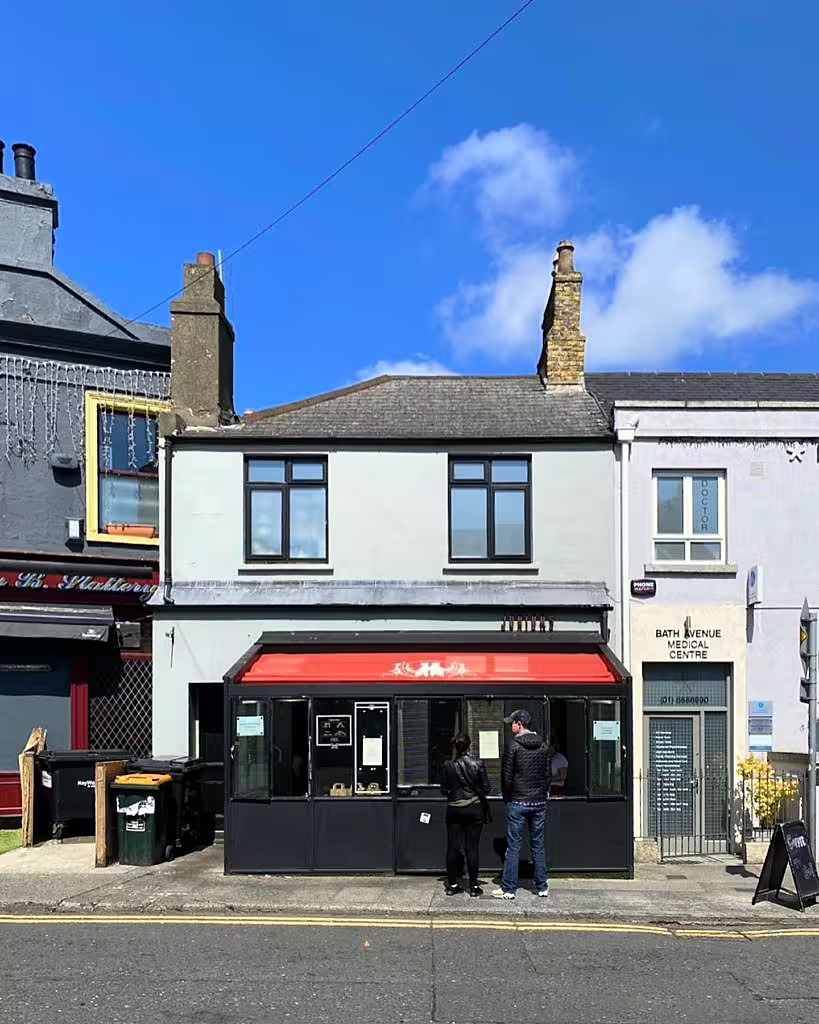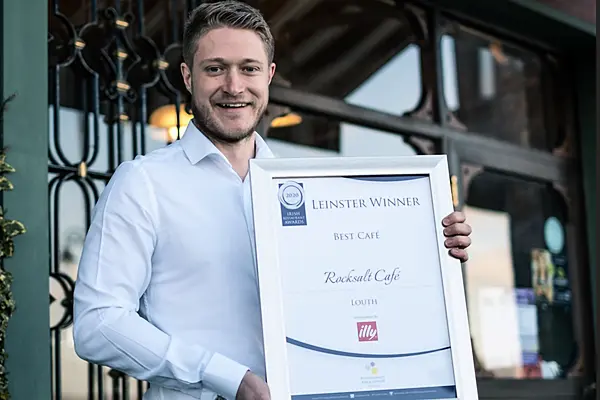BARRY MCNERNEY, co-owner of three well-known Dublin establishments – Junior’s Deli & Cafe, Paulie’s Pizza, and Lotts & Co. – reflects on reopening, the year-and-a-half that was, and new, post-pandemic opportunities.
This article was originally published in the Summer 2021 issue of Hospitality Ireland Magazine, in July of 2021.
Barry McNerney is a former equity trader who left the banking world in 2008 and set up his first restaurant, Junior’s, in 2008. In 2010, he opened Paulie’s Pizza. In 2013, he opened the Old Spot pub, which went on to be included in the Michelin Guide for gastropubs. In 2015, he opened the Lotts & Co. gourmet supermarket in Beggars Bush. In 2018, he launched a new business, UnifyOrdering, along with Louis Williams and Paul Lawless.
What are your expectations for the reopening of the sector?
Generally, I’m very positive. Obviously, there are real challenges about getting staff – that’s been an issue prior to the pandemic – but right now, it’s particularly acute, but hopefully this is just a shortterm problem, and, again, I think people will find a way to overcome it.
The first couple of nights might feel a little strange, as everybody is a little out of practice, but there’s nothing like a busy service to help iron out the kinks, and in no time, everybody will be back in the groove.
I think the demand will be strong, as the vast majority of Irish people will be staying in Ireland for the summer, rather than heading abroad. This demand will be particularly strong for suburban and destination spots throughout the country, as huge amounts of Irish staycationers will look to enjoy the summer at home.
There is definitely pent-up demand, which will see lots of places busy for the first couple of months, and I hope that demand will continue into the autumn. I think if things stay positive on Covid news, in conjunction with continued government support, then the next six months will allow the industry to get properly back on its feet.
What changes do you expect to see in restaurants?
As a result of staff shortages, I think many restaurants will look to be able to serve as many customers as possible with fewer hands on deck. This will naturally result in more set menus, or even shorter menus. Set menus will also happen as a result of the relatively short time allowed – one hour and 45 minutes – as restaurants try and allow customers to get in and out efficiently in that amount of time.
You’ll also see most restaurants continuing to offer some element of click-and-collect. This will allow chefs to prepare these offerings ahead of service whilst bolstering earnings for restaurants that will still have limited capacity, due to social distancing.
In the long run, we’ll see many restaurants opening fewer days per week, with fewer locations open on Mondays and Tuesdays, as restaurants focus their resources on the more profitable days of the week, so that will result in possibly less turnover, but the money they do make will hopefully be more profitable. This also has the benefit of allowing hospitality a better work-life balance, which I think is essential in the long run, if we want to keep attracting talent into the industry.
What changes do you expect to see in customers?
A little like people working in restaurants, people are also a little bit rusty, and many probably even have a little bit of trepidation about the idea of going back into a restaurant. However, I think that once they are sitting in a restaurant, enjoying great food and service, they will quickly forget about any worries. If I’ve learnt one thing since the onset of Covid, people are unbelievably adaptive. Things we were doing naturally within days of the first lockdown would have seemed completely unbelievable only weeks earlier. I think the same will happen in reverse this time, as any fears will quickly evaporate as they start to enjoy special occasions.
Over the last 18 months, people have become very used to cooking and eating at home. I think this trend, to dine and entertain at home, will continue. This is good news for Irish food retailers and producers, but could have an effect on the overall demand for the restaurant industry, but I think places serving great food with top service in enjoyable surroundings will be able to adapt their business to meet the demand and continue to succeed into the future.

Juniors
How adaptable is the restaurant industry?
More than any other industry, restaurants are perfectly suited to quickly alter their businesses, adapt, and reduce costs to meet supply and demand.
The ability to innovate has helped many restaurants to quickly create new revenue streams in response to Covid restrictions. Many restaurants have now pivoted to include retail and takeaway offerings. I think the restaurant of the future, particularly in the middle range, will be a combination of sit-down dining, retail, and takeaway/delivery options.
I think, in order to thrive, restaurants will need to embrace technology that makes their operations more efficient, and which helps to bolster the bottom line whilst also moving away from tech platforms that look to gouge their margins.
What are the greatest challenges facing your businesses at the moment?
Uncertainty. This has improved somewhat, with government announcements about when restrictions would be lifted, but, for a long time – from January to May – there was no plan.
This meant restaurants couldn’t make their own plans, which made managing finances and discussions with staff almost impossible.
When a restaurant is working well, it has a natural rhythm, and the stopping and starting and changing of rules and restrictions has been extremely challenging to all parties in restaurants, and in the food-and-drinks industry as a whole. That’s why I think we saw so many operators staying closed since the start of the year. The upheaval of opening and then closing was simply too much to bear. I think most restaurants want to believe and are operating on the assumption that this will be the last lockdown.
Are there opportunities, do you think?
One hundred per cent. The Irish restaurant scene had a complete renaissance during the last recession, from 2008 to 2014. Loads of new ideas and innovative, buzzy restaurants were born during that time. From 2015 on, prices for rents and key money continued to rise, which priced many young people and first-time operators from entering the market. I think many new places will start to spring up over the next few years, attracted by cheaper start-up costs, and, hopefully, we will see new blood and fresh ideas coming on the scene.

Paul and Barry McNerney of Lotts & Co, contemporary grocery shop
What plans do you have for the next six to nine months?
In UnifyOrdering, we’ve used the lockdown as an opportunity to bring a lot of new staff into the company and train them up. We’ve been gearing ourselves up for the market reopening. In the next six to nine months, we want to cement our place as the de-facto way that restaurants, cafes, food retailers and pubs order their goods from their wholesale suppliers. We’re already seeing order numbers go through the roof, as outdoor dining resumes. We want to continue refining our product and growing our market share here in Ireland, and then look to move into international markets.
In Lotts & Co. we have a new store opening in Terenure, towards the end of the summer, so we’re excited to move into a great area.
What should the government be doing for the hospitality industry now?
By and large, I think the government supports have done their job and prevented the avalanche of closures that many people expected at the onset of the pandemic. That’s not to downplay in any way how extremely tough and challenging it has been over the last 14 months.
The government has announced that supports will stay in place until December, which is very welcomed.
Aside from the government assistance, legislation in general needs to be more industry-friendly and should take a more pragmatic stance on things like calorie counts on menus and overly severe, and often haphazard, rules on food safety procedures. These can place huge additional cost burdens on new businesses and can price many small, independent operators out of the market and funnel the market towards large, often international operators and producers.
How has the last year and a half been for you, personally, and for your business?
I think, like everybody else, on a personal level, it’s been a roller-coaster over the last 18 months. It’s certainly given me more time at home to improve my cooking skills.
On a professional level, the restaurants I operate were very fortunate, in that the food we offer naturally lends itself to takeaway – pizzas in Paulie’s Pizza and New York deli-style sandwiches in Junior’s Deli.
I’m also the owner of Lotts & Co. grocery, and, again – fortunately – the food retail sector has actually grown during the lockdown. We opened our second outlet, in Clontarf, last November, which has, thankfully, been very well received.
It’s also been a real landmark year for UnifyOrdering, which digitises and fixes the ordering process for buyers – restaurants, cafes, pubs, retailers, etc. – and suppliers – wholesale distributors and producers. Like many other people in the food-and-drinks industry, we saw our business completely wiped out in March 2021, but, thankfully, by June we were back growing stronger than ever, which is a real testament to the resilience of the Irish industry.
We’ve used the last few months, as the industry has remained somewhat subdued, to work very hard in the background on improving our product and what we offer to our customers, and, like everybody else, we’re excited to see the market finally reopen.
AT A GLANCE
JUNIORS
COVERS: 24, post-Covid
STAFF: 6 front of house, 8 back of house
PAULIE’S
COVERS: 60, post-Covid
STAFF: 10 front of house, 10 back of house.
Read More: Hospitality Ireland Summer 2021: Read The Latest Issue Online!








